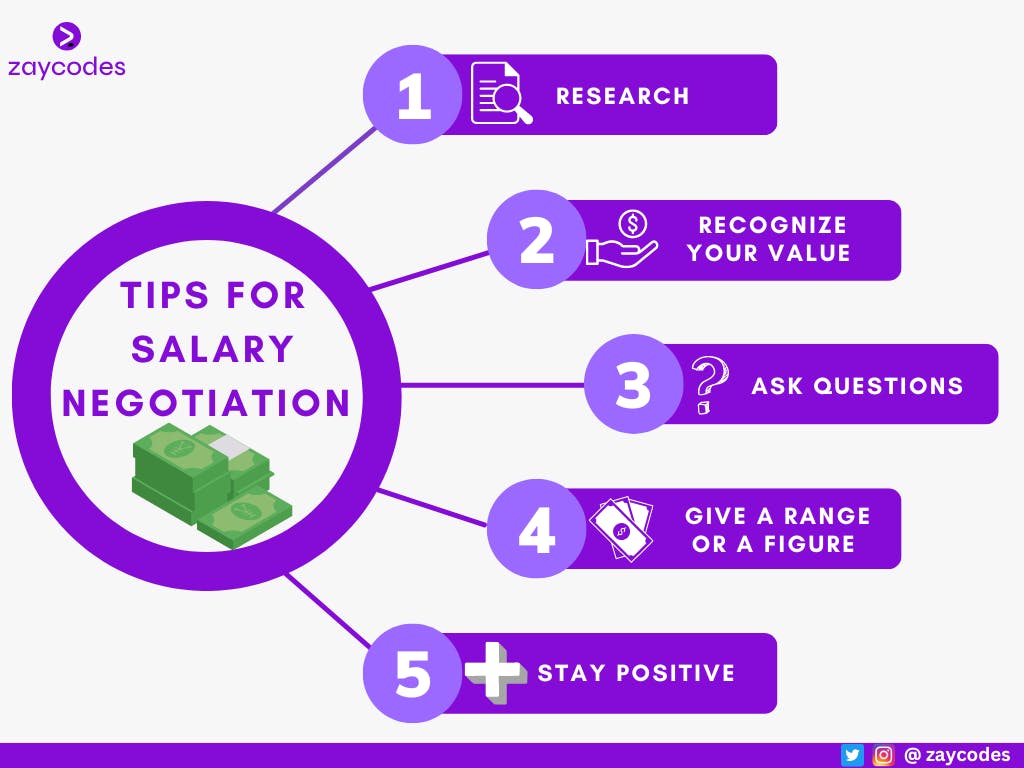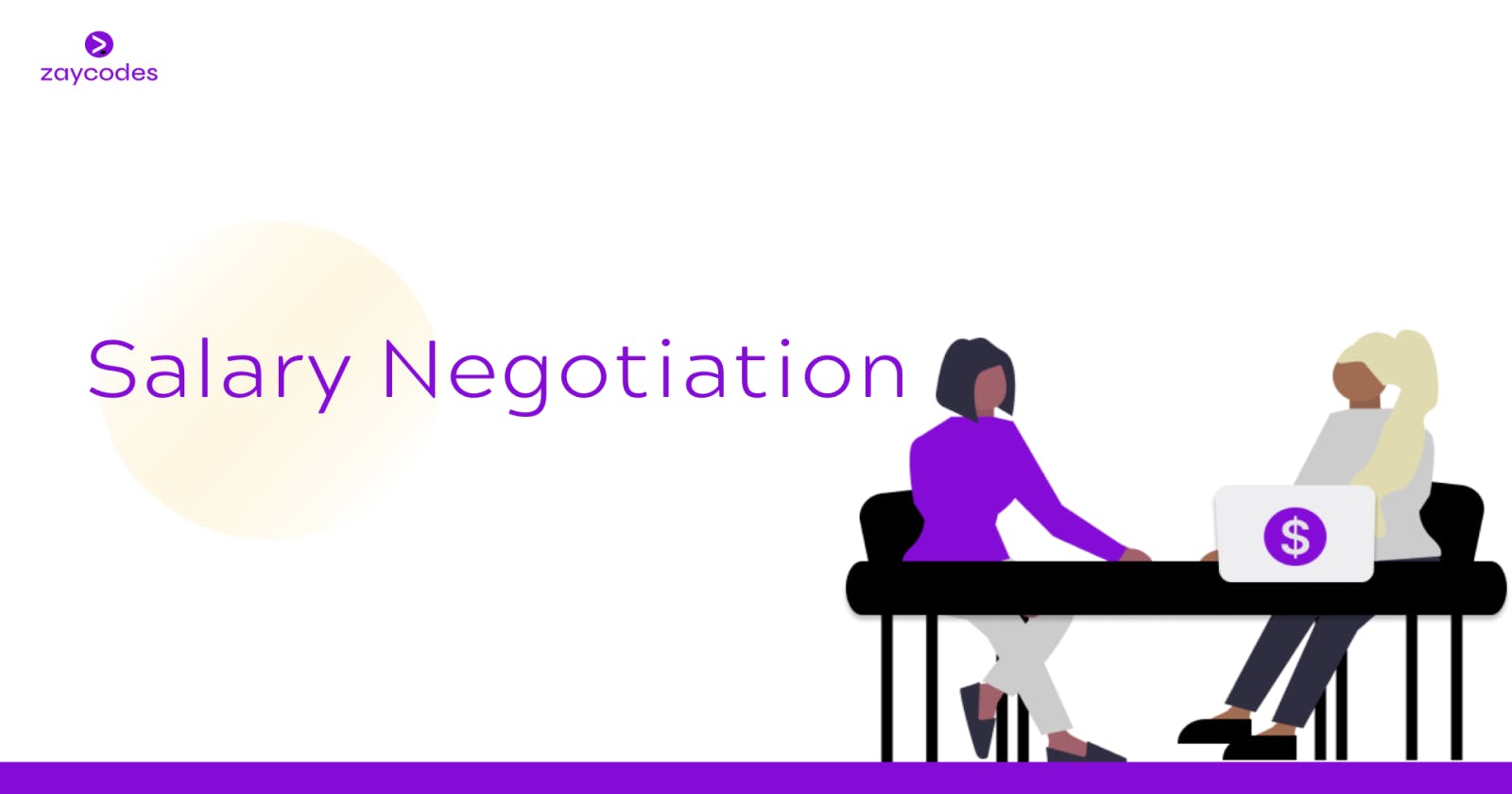What You Need to Know About Salary Negotiation
Tips on how to get good pay in your career
“In business as in life- you don't get what you deserve, you get what you negotiate” - Chester L. Karrass
Congratulations! If you’re reading this, I’m sure you have passed the interview stage and are about to get an offer. Negotiating your salary is your opportunity to prove your value and ask for what you're worth, so knowing what to expect is an important step.
The salary you're paid or offered has nothing to do with what you're spending, so don't accept one that's lower because you don't need the extra income. Accepting a lower offer may negatively impact the next person that will take on that job after you leave.
When negotiating your salary, remember that there are other benefits besides the basic salary in some sectors. This article outlines 5 tips for negotiating a salary.
Reasons for salary negotiation
Before we delve into how you can negotiate your salary, let’s know why recruiters may want you to negotiate your salary.
As part of the interview process, the interviewer or employer wants to know about your salary preferences.
The interviewer wants to know how you deal with negotiations.
The interviewer wants to hear if you can justify your salary demand.
Tips on how to get good pay in your career
Here are things that you need to know when you are negotiating your salary to get the highest salary possible;

Tip #1: Research
While coming up with your value, you need to know what companies are paying someone with your experience and skills. Your skills have a market value or pay grade.
Browse the internet to determine what other people with your job role make in companies and within specific geographical areas. Taking the time to research the current market before making an offer ensures that you know what the market is like. You can go into any negotiation with the confidence that your request isn't out of the ordinary.
Getting a feel of what people are making at a company can be done by looking at numerous sources of information like; Payscale, Glassdoor and Levels. Do not use one resource to determine the current pay grade or your expected salary.
Also, put the company’s financial position in perspective; is it a new startup with little capital or a long-standing company that typically pays higher salaries? You can verify this information by checking their website and checking for news about the company.
Tip #2: Recognize your value or worth
To justify your expected salary or a salary increase, you need to know what you are worth and how you will communicate that to your supervisor or the hiring manager. Prove why you're worth what you are by presenting cases that certify that. Have a list of cases where people highly recognized you for your work, awarded contracts for your previous employer, appraisals, increased productivity, etc. Be assertive and calm in the conversation. Resell yourself during the negotiation.
Tip #3: Ask questions
Inquiring about the role and the company before stating your expectations might be a helpful way to clarify your expectations. You can ask these questions:
What level is the job role?
What are the requirements for this role?
What is the salary band for this role?
What is the valuation of the company?
Are there any other benefits attached to the role?
Tip #4: Give a range or a figure
Giving a range makes you seem polite and flexible, you are basically giving your employer a chance to choose what you want. It's a win-win situation.
Let’s call the high and low values of the range A and B. It is advisable to inflate your range. A should be slightly higher than what you’re worth, and B should be the actual figure you want as compensation. This way, you are sure that you won't be offered less than you're worth.
However, it's okay to give an exact figure if it's justified, but if you don’t have an exact figure, then a range is acceptable.
Indicate whether you are stating the expected gross or net salary.
Tip #5: Stay positive
Keep in mind that most managers also dislike bargaining. Your potential employer is not your foe. Keep your tone positive while negotiating salary. If you would like a better starting salary offer, you have to ask for it. Job seekers too often accept the first number on the table. But whether the economy is strong or uncertain, employers are eager to bring on team members with specialized skills and expertise that can help them the most. Homework, tact and confidence are the keys to your success in salary negotiation.
Scenario
When you're asked for your expected salary, before answering this question, you can ask what the company's budget for the role is. It's also okay if the company's budget is below expectation, you can state it and state the reasons why you are requesting a higher amount.
Here’s how you can answer these questions in an interview:
Interviewer: What is your current salary?
Interviewee: “My current salary is $xxx. I understand that this information is useful to your company but I want to state clearly that in this role, I would have greater responsibilities than I do in my current position. Although I am prepared for such a role, I also hope to be compensated appropriately.”
Interviewer: What are your salary expectations for this role?
Interviewee: *“According to my research, the average salary range for this position in this sector is between $abc and $xyz. My salary preference ranges from $*** to $*** monthly. I feel that investing an amount within that range will yield a positive return. I am worth this salary because of my skills, track record of achievements and experience which I will channel to this role to add value to this company.”
Another answer can be;
Interviewee: “As a result of my many years of experience and skills gained in this position, I feel I am well qualified for the position. It is my mission to bring leadership qualities, a passion for consistently achieving outstanding results, and a commitment to the company's success. I would prefer a net pay of $*** per annum and feel highly motivated in my position, and I am confident you will be pleased with the results.”
Conclusion
This article has given tips on salary negotiation, I hope you utilize them.
Let me know about your interview experiences on Twitter. I would love to hear about it.

